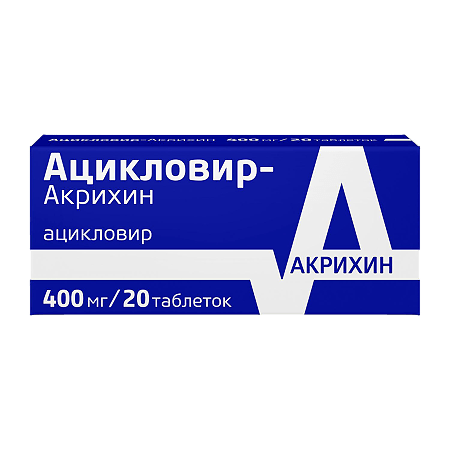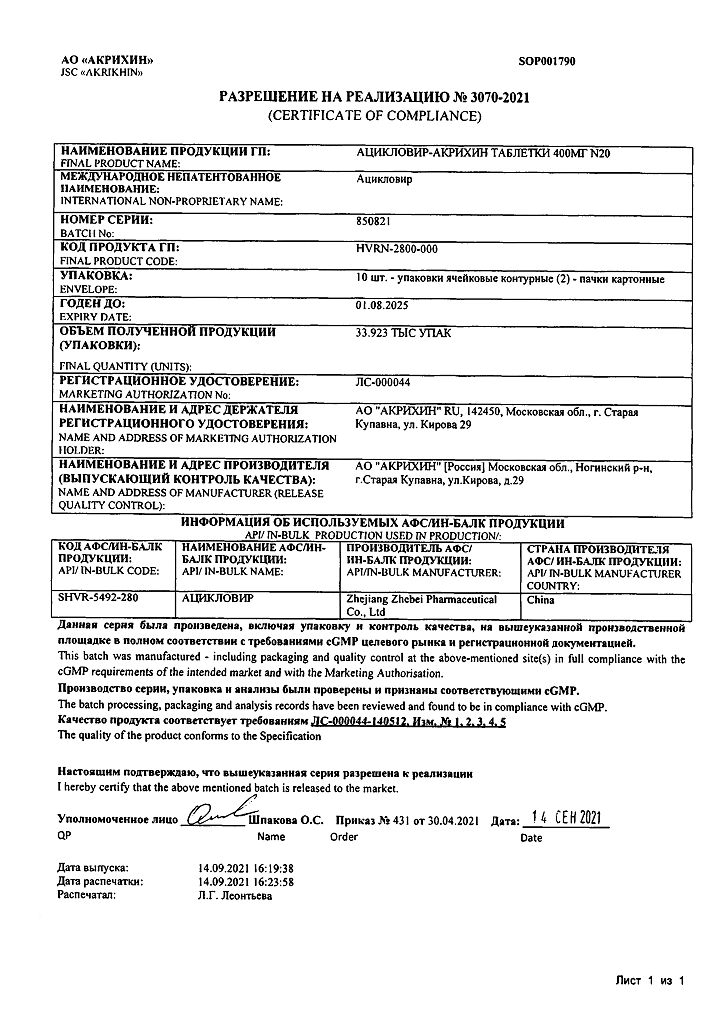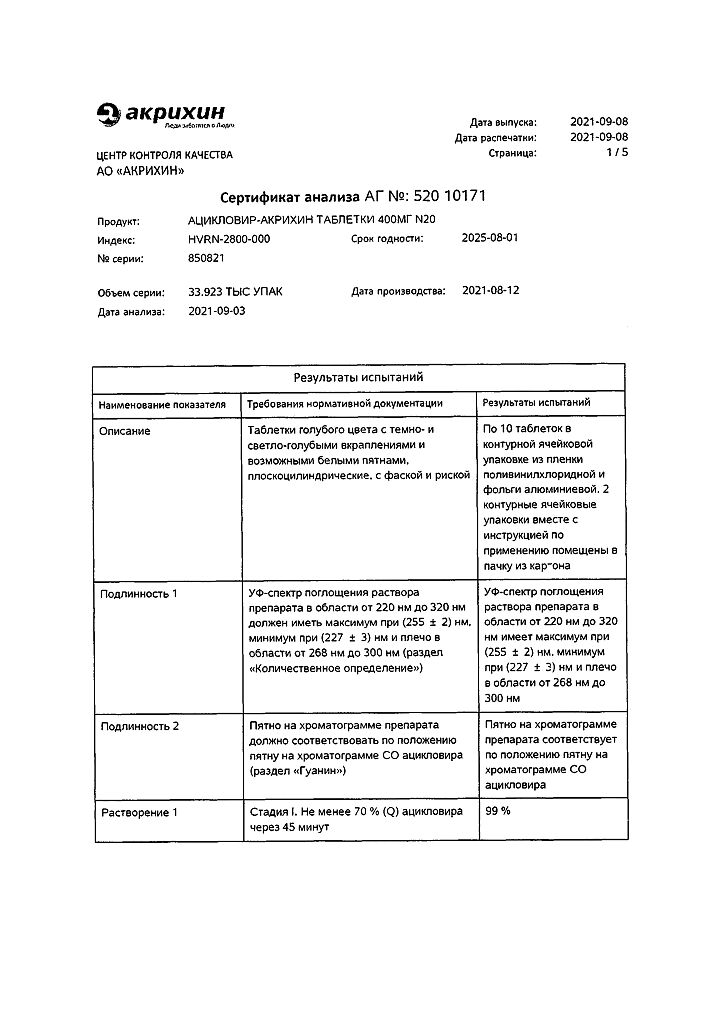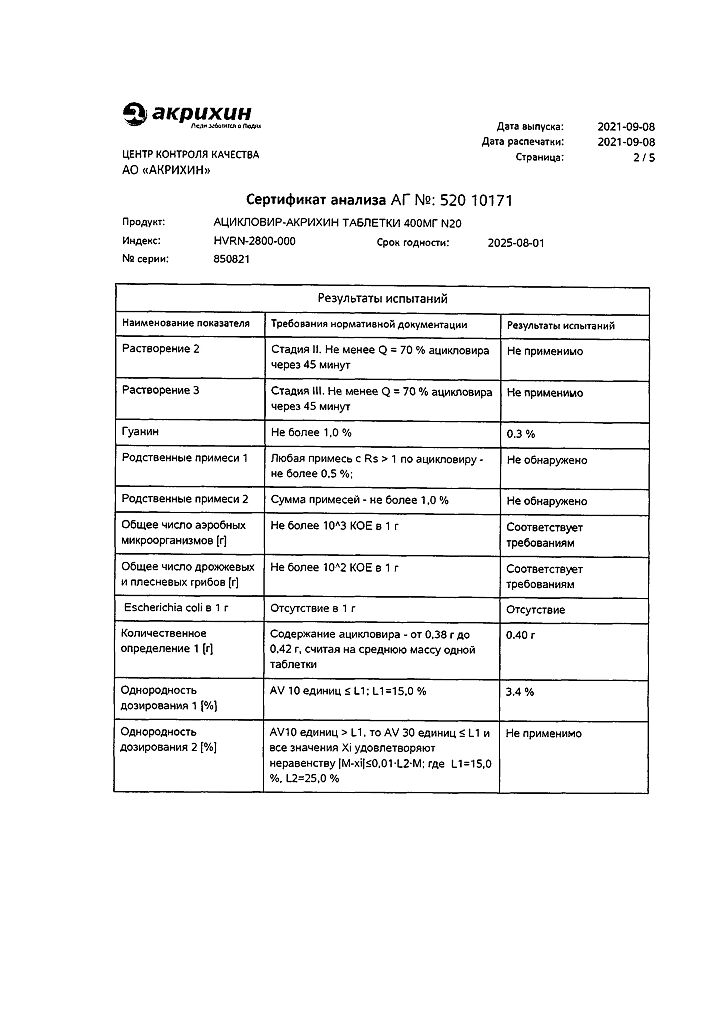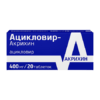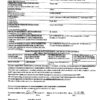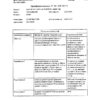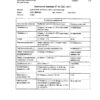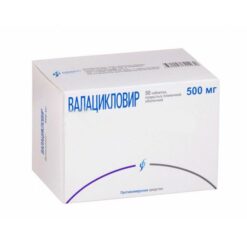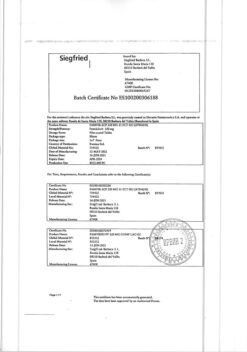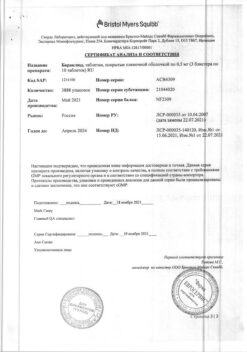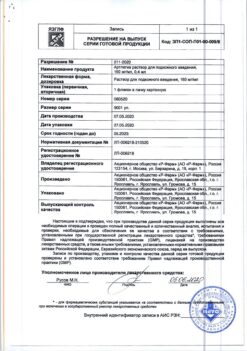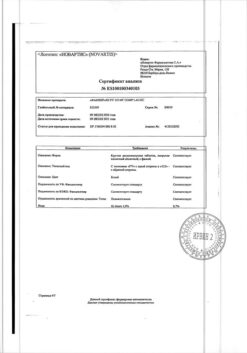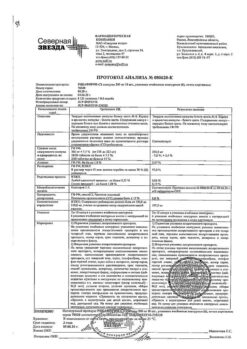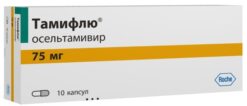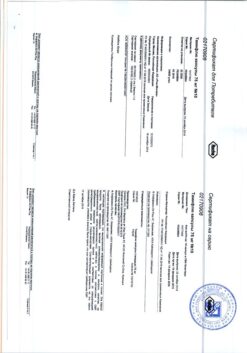No products in the cart.
Description
The antiviral drug is a synthetic analog of thymidine nucleoside.
In infected cells containing viral thymidine kinase is phosphorylated and converted into acyclovir monophosphate. Under the influence of guanylate cyclase acyclovir monophosphate is converted to diphosphate and to triphosphate under the influence of several cellular enzymes. High selectivity and low toxicity for humans is conditioned by absence of necessary enzyme for acyclovir triphosphate formation in intact cells of macroorganism.
Aciclovir triphosphate “embedding” into DNA synthesized by the virus blocks virus multiplication. Specificity and very high selectivity of action are also due to its preferential accumulation in cells affected by the herpes virus. It is highly active against Herpes simplex viruses of types 1 and 2; Varicella zoster viruses; Epstein-Barr viruses (types of viruses are listed in ascending order of MAC value of acyclovir).
It is moderately active against CMV. In herpes it prevents formation of new rash elements, reduces the probability of cutaneous dissemination and visceral complications, accelerates crusts formation, reduces pain in the acute phase of herpes zoster. It has an immunostimulatory effect.
Indications
Indications
– Treatment of primary and recurrent severe genital herpes (including in patients with impaired immunity) – orally and parenterally;
– prevention of often recurrent (6 or more cases per year) genital herpes (including in patients with impaired immunity) – orally;
– treatment of primary and recurrent herpes simplex with damage to the skin and mucous membranes, caused by the Herpes simplex virus types 1 and 2, in patients with impaired immunity, orally, parenterally;
– prevention of herpes simplex in patients with impaired immunity (including after transplantation and taking immunosuppressive drugs, HIV-infected patients, during chemotherapy) – orally;
– encephalitis caused by the Herpes simplex virus types 1 and 2 – parenterally;
– treatment of herpes zoster caused by the Varicella zoster virus, in adults – orally; in patients with impaired immunity and with generalized herpes zoster in patients with unimpaired immunity – parenterally;
– prevention of herpes zoster caused by the Varicella zoster virus, after the initial period of using acyclovir for parenteral use in all patients with impaired immunity (including after transplantation and when taking immunosuppressive drugs, HIV-infected patients, during chemotherapy) – orally;
– herpes zoster with eye damage – orally, parenterally;
– generalized infection in newborns caused by the Herpes simplex virus – parenterally;
– chicken pox in patients with unimpaired immunity within 24 hours after the appearance of a typical rash – orally, in patients with impaired immunity – parenterally.
Pharmacological effect
Pharmacological effect
The antiviral drug is a synthetic analogue of thymidine nucleoside.
In infected cells containing viral thymidine kinase, phosphorylation occurs and is converted to acyclovir monophosphate. Under the influence of acyclovir guanylate cyclase, monophosphate is converted into diphosphate and, under the action of several cellular enzymes, into triphosphate. High selectivity of action and low toxicity to humans are due to the absence of the necessary enzyme for the formation of acyclovir triphosphate in intact cells of the macroorganism.
Acyclovir triphosphate, “integrating” into the DNA synthesized by the virus, blocks the reproduction of the virus. The specificity and very high selectivity of the action are also due to its predominant accumulation in cells affected by the herpes virus. Highly active against Herpes simplex virus types 1 and 2; the virus that causes chickenpox and herpes zoster (Varicella zoster); Epstein-Barr virus (types of viruses are indicated in increasing order of the MIC of acyclovir).
Moderately active against CMV. In case of herpes, it prevents the formation of new rash elements, reduces the likelihood of skin dissemination and visceral complications, accelerates the formation of crusts, and reduces pain in the acute phase of herpes zoster. Has an immunostimulating effect.
Special instructions
Special instructions
Acyclovir should be prescribed with caution to patients with impaired renal function and elderly patients due to an increase in the half-life of acyclovir. When using the drug, it is necessary to ensure the supply of a sufficient amount of fluid.
The ointment is not recommended to be applied to the mucous membranes of the mouth, eyes, and genitals, because the development of severe local inflammation is possible. The earlier it is started, the higher the effectiveness of treatment when using the ointment.
In patients with immunodeficiency, with multiple repeated courses of treatment, viral resistance to acyclovir sometimes develops. When taking the drug, kidney function should be monitored (blood urea and plasma creatinine levels).
Active ingredient
Active ingredient
Acyclovir
Composition
Composition
1 tab.:
– acyclovir 400 mg.
Excipients:
microcrystalline cellulose,
polyvinylpyrrolidone,
indigo carmine,
magnesium stearate,
sodium starch glycolate,
purified water.
Pregnancy
Pregnancy
Use during pregnancy is only possible if the expected benefit to the mother outweighs the potential risk to the fetus.
If it is necessary to use the drug during lactation, breastfeeding should be stopped.
Contraindications
Contraindications
Hypersensitivity to acyclovir, ganciclovir, valacyclovir or components of the drug, lactation period, children under 3 years of age.
With caution:
– pregnancy;
– old age;
– dehydration;
– renal failure;
– neurological disorders or neurological reactions to taking cytotoxic drugs (including in history).
Side Effects
Side Effects
From the digestive system: nausea, vomiting, diarrhea, abdominal pain; rarely – a reversible increase in bilirubin content and the activity of liver enzymes.
From the hematopoietic system: very rarely – anemia, leukopenia, thrombocytopenia.
From the urinary system: rarely – increased levels of urea and creatinine in the blood; very rarely – acute renal failure.
From the central nervous system: headache, weakness, dizziness, increased fatigue, confusion, hallucinations, drowsiness, paresthesia, convulsions, decreased concentration, agitation.
Allergic reactions: itching, rash, Lyell’s syndrome, urticaria, erythema multiforme, incl. Stevens-Johnson syndrome, angioedema, anaphylaxis.
Other: fever, lymphadenopathy, peripheral edema, blurred vision, myalgia, alopecia.
Interaction
Interaction
When used simultaneously with probenecid, the average half-life of acyclovir increases and the clearance of acyclovir decreases.
When taken simultaneously with nephrotoxic drugs, the risk of developing renal dysfunction increases.
Storage conditions
Storage conditions
Store in a dry place, protected from light, out of reach of children, at a temperature not exceeding 25°C.
Manufacturer
Manufacturer
Akrikhin JSC, Russia
Additional information
| Conditions of storage | Store in a dry, protected from light, out of the reach of children, at a temperature not exceeding 25 ° C. |
|---|---|
| Manufacturer | Akrihin HFC JSC, Russia |
| Medication form | pills |
| Brand | Akrihin HFC JSC |
Related products
Buy Aciclovir-Acrihin, tablets 400 mg 20 pcs with delivery to USA, UK, Europe and over 120 other countries.

